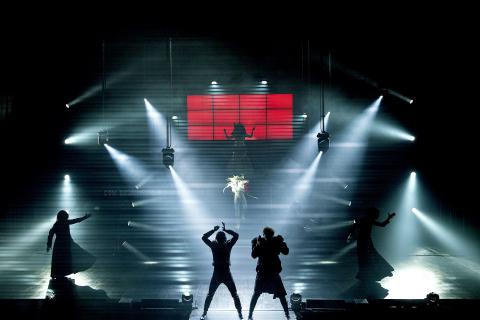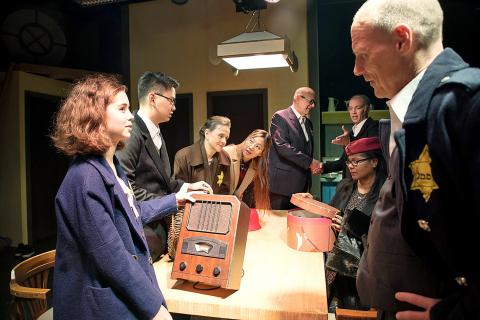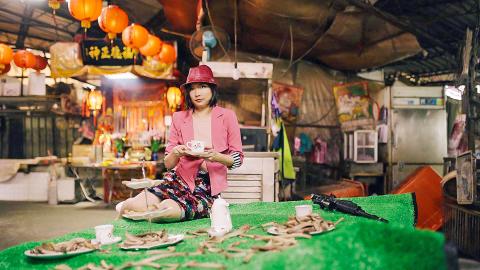Great theater can open audiences to new realms, delight and entertain, awe and inspire, draw tears, tickle the funny bone or deliver a hit straight to the solar plexus. The best challenge their viewers to follow them as their tales unfold, no matter where that might lead.
Four plays being performed around Taipei this weekend will certainly provide four different challenges.
‘RICHARD III’

Photo courtesy of Nicolas Joubard
The biggest, brashest — and the longest — is La Piccola Familia’s production of founder and director Thomas Jolly’s Richard III at the National Theater, the final play in this year’s Taiwan International Festival of Arts.
The 36-year-old Jolly has been making a name for himself at home in France with his unabridged and avant-garde takes on William Shakespeare’s three Henry VI plays, including a marathon staging of all three plays at the Festival d’Avignon, in 2014 that lasted 18 hours.
The following year saw the premiere of his Richard III, the final installment of Shakespeare’s first tetralogy of English history and one of the Bard’s longest works.

Photo courtesy of Lee Hsin-chee
Jolly’s production, in which he stars as the ambitious and Machiavellian Richard, duke of Gloucester, who battles his way to the throne by killing all family members and others who stand in his way, lasts about four-and-a-half hours, including a 30-minute intermission.
Jolly, who is also credited as the designer, has staged it as a Goth rock concert, filled with black costumes and whiteface make-up; the final performance of a doomed star.

Photo courtesy of M.O.V.E. Theatre
Richard III will be performed in French with Chinese surtitles, and comes with an advisory about the smoke, lighting effects and blood.
‘PICNIC ON THE BATTLEFIELD’
Upstairs in the National Experimental Theater will be a show about a different war and a different kind of family.

Photo courtesy of Tang Chien-jer
Dark Eyes Performance Lab (黑眼睛跨劇團) has revived director Hung Hung’s (鴻鴻) 2015 interpretation of Spanish playwright/author and filmmaker Fernando Arrabal’s classic one-act anti-war play from 1961, Picnic on the Battlefield (戰場上的野餐).
Many of Arrabal’s works were centered on the horrors of fascism and World War II.

Photo courtesy of Nicolas Joubard
Picnic is about a rather clueless young soldier left on his own in the trenches, whose overbearing parents decide to visit to cheer him up with a picnic, despite the ongoing firefight. The family gathering is interrupted by the arrival of an equally clueless enemy soldier that no one quite knows what to do with.
Hung was invited in 2015 to join directors from Japan, South Korea and China in directing versions of Picnic for the annual Asian Theater Directors’ Festival in Toga, Japan. It was the first time Dark Eyes Lab was invited to perform overseas.
Hung and his troupe set their play in Asia, and make one of the soldiers Taiwanese and the other Okinawan, which allowed them to tackle issues raised by Japan’s colonial rule of Taiwan as well.
The company offered a three-tier ticket plan, with the limited number of top-priced tickets coming with picnic foods and floor seating on picnic mats. Those options have already sold out.
‘THE DIARY OF ANNE FRANK’
Over at Huashan 1914 Creative Park, the Butterfly Effect Theatre Company will also immerse its audiences in wartime horrors and family dynamics, with Wendy Kesselman’s version of The Diary of Anne Frank.
The company premiered the production at The LAB Space at the beginning of December last year, but the five shows sold out weeks in advance and drew a lot of interest from local schools, prompting director Brook Hall to look for a bigger venue where he could stage additional performances.
Given the often appalling ignorance in Taiwan of the horrors of the Holocaust and the Nazi’s Third Reich, as demonstrated in recent years by use of Nazi-themed costumes for a high-school cosplay event, the use of a cartoon figure of Adolf Hitler to sell German-made space heaters, or the overreliance on Hitler by politicians seeking to slur their opponents or rival parties, repeat performances of The Diary of Anne Frank are badly needed.
With the support once again of the Israel Economic and Cultural Office Taipei and help from the Ben Feng Cultural Foundation, The Diary of Anne Frank will be performed three times this weekend at the Umay Theater and then move to Tainan for three shows, starting on May 19, at the Tainan E-Warehouse.
Kesselmen’s 1997 adaptation of Frank’s story about the life of her family and four other Jews hiding in a secret annex above her father’s offices in Nazi-occupied Netherlands includes information that was not available when Frances Goodrich and Albert Hackett originally adapted Frank’s Diary of a Young Girl for the stage in 1955.
The multinational cast from the December production will reprise their roles, led by Taipei American School middle-school student Camryn Rowe as Anne, and Butterfly Effect stalwarts D.C. Rapier and Sarah Brooks as her parents.
The show will be performed in English, with Chinese surtitles.
While Hall has put on plays before at other Huashan sites, the Anne Frank tale offers his company a chance to demonstrate that it can handle an expanded run in a bigger venue, as well as a chance to move beyond its Taipei-base.
‘THE UNNAMED’
Last, but not least, is a play about a new battleground in modern-day life, cyberbullying, and cultural dangers of the ever-growing addiction to social media, with an expanded run of its own.
M.O.V.E. Theatre (動見体劇團) tonight launches its two-weekend run of The Unnamed (病號) at the Wellspring Theater in the Gongguan District (公館).
Director Fu Hong-zheng (符宏征) often explores contemporary history, cultural and social issues in the 12-year-old company’s works, so the problems of trolling, abuse and Internet addiction and their impact on mental health are a natural progression of its earlier works.
The Unnamed, which began as a university drama class activity, asks who should bear responsibility for the harm, mental, physical or financial caused by statements or campaigns over the Internet and via cellphone apps.
Much of the play was inspired by research into a number of suicides in Taiwan and other nations in recent years that have been linked to cyberbullying.
The play, written by actor/playwright Daniel Wang (王靖惇), features nine characters, none of whom is given a name, and it begins with a suicide.
Other core M.O.V.E. members, including choreographer/movement director Tung I-fen (董怡芬) and stage designer Darren Liu (劉達倫), worked on the show.
The Unnamed, like Picnic on the Battlefield, will be performed in Mandarin.
Performance Notes
WHAT: Richard III
WHEN: Tomorrow at 7pm, Saturday and Sunday at 2pm
WHERE: National Theater (國家戲劇院), 21-1 Zhongshan S Rd, Taipei City (台北市中山南路21-1號)
ADMISSION: NT$600 to NT$2,500, available at NTCH box offices, online at www.artsticket.com.tw and at convenience store ticketing kiosks
Performance Notes
WHAT: The Diary of Anne Frank
WHEN: Tomorrow and Saturday at 8pm, Sunday at 2:30pm
WHERE: Huashan 1914 Creative Park (華山1914文化創意產業園區), Umay Theater (烏梅劇院), No. 1, Bade Rd Sec 1, Taipei City (台北市八德路一段1號)
ADMISSION: NT$900 and NT$1,500, available at NTCH box offices, online at www.artsticket.com.tw, at convenience store ticketing kiosks and at the door
ADDITIONAL PERFORMANCES: May 19 at 2:30pm and 8pm, May 20 at 2:30pm at the Tainan E-Warehouse (奔放E倉庫), 107, Huangong Rd, Tainan City (台南市環工路107號). Tickets are NT$800, available as above
Performance Notes
WHAT: Picnic on the Battlefield
WHEN: Tomorrow and Saturday at 7:30pm and Saturday and Sunday at 2:30pm
WHERE: National Experimental Theater (國家實驗劇場), 21-1 Zhongshan S Rd, Taipei City (台北市中山南路21-1號)
ADMISSION: Only seats left are NT$700, available at NTCH box offices, Eslite ticketing, online at www.artsticket.com and convenience story ticket kiosks. Saturday’s matinee is sold out
Performance Notes
WHAT: The Unnamed
WHEN: Tonight through Sunday at 7:30pm, Saturday and Sunday at 2:30pm, April 19 through April 21 at 7:30pm, April 21 matinee at 2:30pm
WHERE: Wellspring Theater (水源劇場), 10F, 92 Roosevelt Rd Sec 4, Taipei City (台北市羅斯福路四段92號10樓)
DMISSION: NT$900; available at the NTCH and Eslite ticketing, online at www.artsticket.com, at convenience store ticket kiosks and at the door

In the March 9 edition of the Taipei Times a piece by Ninon Godefroy ran with the headine “The quiet, gentle rhythm of Taiwan.” It started with the line “Taiwan is a small, humble place. There is no Eiffel Tower, no pyramids — no singular attraction that draws the world’s attention.” I laughed out loud at that. This was out of no disrespect for the author or the piece, which made some interesting analogies and good points about how both Din Tai Fung’s and Taiwan Semiconductor Manufacturing Co’s (TSMC, 台積電) meticulous attention to detail and quality are not quite up to

April 21 to April 27 Hsieh Er’s (謝娥) political fortunes were rising fast after she got out of jail and joined the Chinese Nationalist Party (KMT) in December 1945. Not only did she hold key positions in various committees, she was elected the only woman on the Taipei City Council and headed to Nanjing in 1946 as the sole Taiwanese female representative to the National Constituent Assembly. With the support of first lady Soong May-ling (宋美齡), she started the Taipei Women’s Association and Taiwan Provincial Women’s Association, where she

Chinese Nationalist Party (KMT) Chairman Eric Chu (朱立倫) hatched a bold plan to charge forward and seize the initiative when he held a protest in front of the Taipei City Prosecutors’ Office. Though risky, because illegal, its success would help tackle at least six problems facing both himself and the KMT. What he did not see coming was Taipei Mayor Chiang Wan-an (將萬安) tripping him up out of the gate. In spite of Chu being the most consequential and successful KMT chairman since the early 2010s — arguably saving the party from financial ruin and restoring its electoral viability —

It is one of the more remarkable facts of Taiwan history that it was never occupied or claimed by any of the numerous kingdoms of southern China — Han or otherwise — that lay just across the water from it. None of their brilliant ministers ever discovered that Taiwan was a “core interest” of the state whose annexation was “inevitable.” As Paul Kua notes in an excellent monograph laying out how the Portuguese gave Taiwan the name “Formosa,” the first Europeans to express an interest in occupying Taiwan were the Spanish. Tonio Andrade in his seminal work, How Taiwan Became Chinese,